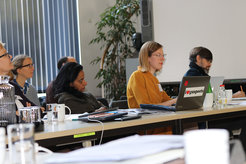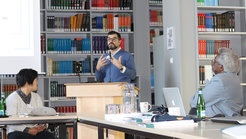Blog | December 2018
Lessons of an Eccentric Perspective on Empire
by Jeremy F. Walton
Consider, for a moment, an iconic building or monument: The Great Pyramid of Giza, the Eiffel Tower, or the Taj Mahal. Seen from afar, the silhouettes of these famous structures are immediately recognizable—countless reproductions anticipate and delimit our view of them. It can be difficult to see the object before our eyes, precisely because we already know what we will see. Textures, peculiarities, signs of weathering and disrepair, the play of shadow and light: Such phenomena only become visible when we move closer and disrupt the prefiguring power of the iconic image. In order to see beyond the “Great Pyramid,” the “Eiffel Tower,” or the “Taj Mahal,” we must destabilize and recalibrate our perspectives—in a phrase, we must view them “off center”.
This same principle applies, mutatis mutandis, to more abstract historical and political entities. Concepts such as “nation” and “empire” ineluctably filter our impressions and evaluations of specific polities, and therefore warrant destabilization. To adopt an eccentric, “off center” perspective entails a double movement of denaturalization, which results in two salutary effects. On one hand, the specific sociohistorical object at hand—e.g. “Europe”; “The Ottoman Empire”; “Asmara”—takes on novel, unanticipated features and forms. On the other hand, our very categories of analysis—e.g. “civilization”; “empire”; “city”—become subject to critical deconstruction and supple reconstitution.

On 31 October and 1 November 2018, a colloquium of scholars, representing an array of disciplines and geographic-historical foci, assembled at the Max Planck Institute for the Study of Religious and Ethnic Diversity under the auspices of the “Empires of Memory” Max Planck Research Group. We did so with the aim of sharpening this double aspiration in relation to the concept of empire. Our collective journey conveyed us to the margins of specific empires in order to resituate our understanding of “empire” in general. As Giulia Carabelli, Miloš Jovanović, and Annika Kirbis, the conceivers and conveners of the workshop, proposed in their orienting remarks: “We seek to off-center the logic of empire as a theoretical and conceptual starting point in the study of imperialism...to blur those contours of meaning which appear explicit, and sharpen the haze beneath.” Over the course of two days together, we productively confronted and contested this “logic of empire” as it continues to authorize certain modes of social scientific inquiry while foreclosing others. Three loose themes and arguments animated our conversations: empire as a mode of humanism; empire as a principle of centralization and differentiation; and, empire as an affective power.
The logic of empire humanizes. Insidiously, empire projects “the human” as a universal category that is internally segmented and hierarchized. Yet, as Banu Subramaniam, Annika Kirbis, and June Rubis each illustrated, the effects and logics of imperialism traverse human and nonhuman worlds. Empire cannot be contained by the dichotomies of nature/culture, human/animal, living/non-living, or subject/object, precisely because the reification of these binaries is partially an effect of the logic of empire itself.

The logic of empire centralizes and, so doing, differentiates. Specific empires gather material and discursive resources in their metropoles, creating cartographies defined by the distinction between center and periphery, and arranging bodies hierarchically according to spatial and racial logics. Against this centripetal imperial force, empires and imperialism must be interrogated from their spatial and social peripheries, temporal margins, and political exteriors, as Glenda Sluga, William O’Reilly, Mostafa Minawi, Liza Wing Man Kam, Miloš Jovanović, and Zach Sell each insisted in various ways. More abstractly, imperialism endeavors to establish Europe as the civilizational apogee of a teleological, universal history.
Echoing Dipesh Chakrabarty, Netsanet Weldesenbet, Nikita Dhawan, Priyamvada Gopal, and Mnyaka Sururu Mboro each reminded us that the project of provincializing Europe is never finished. To approach empire “off center” is also to decenter European premises and powers.
The logic of empire affects. Notwithstanding the role that the colonial empires of western Europe played in ensconcing “reason” as a principle for distinguishing between the civilized and the savage, between rulers and ruled, empires have always constituted regimes of the senses and distributions of the sensible. Empire’s affects were a key thread coursing through our discussions, foregrounded especially by Laura Mills and Serawit Bekele Debele. Moreover, as Mark D. Steinberg and Giulia Carabelli reflected, the emotive moods of empire are often most tangible in the aftermath of imperial polities—empire’s affects are durable, and create duress in Laura Ann Stoler’s sense, long after the political dismantling of empires themselves. Finally, the myriad sensorial and affective dimensions of empire invite multiple modes of representation and critique. We were fortunate to witness two cinematic reflections on empire’s powers—“Waterfront: A Post-Ottoman Post-Socialist Story” by Miloš Jovanović, Miloš Miletić, and Mirjana Radovanović, and “Delirio Güero” by Nina Höchtl—and to learn from Deniz Sözen’s and Ann Sophie Springer’s critical performance and curatorial practices related to imperial legacies.
To adopt an off center perspective on empire is not to dissolve empire entirely, of course. One of the recurrent predicaments that we confronted throughout our debates was the power of empire to subsume and domesticate critique. And yet, I believe that our symposium still succeeded in estranging us from taken-for-granted images and understandings of imperialism. As I move onward from our discussion, the silhouette of empire in my mind is no longer as uniform and settled as it previously was.












